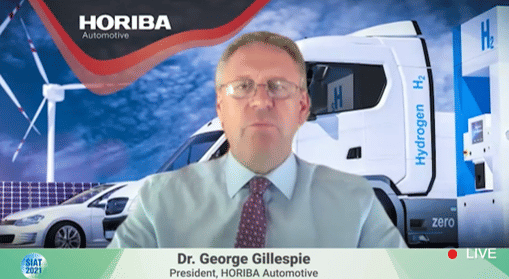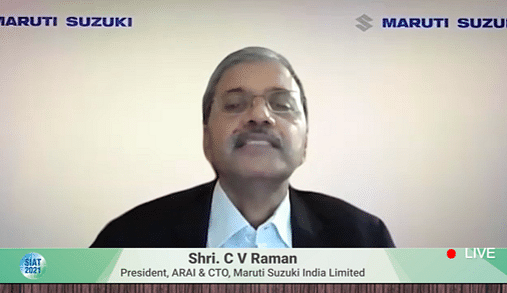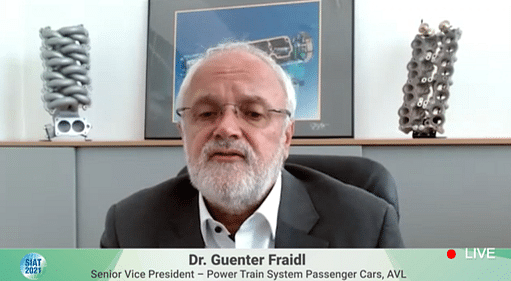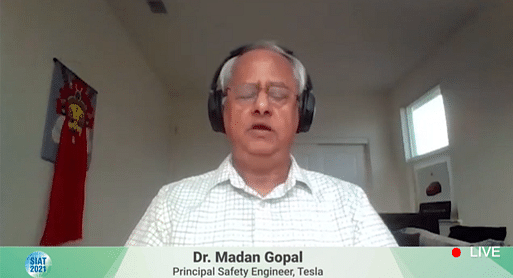SIAT 2021: Global experts debate future mobility trends
The annual symposium is a three-day marathon event with deliberations and expert technical presentations on the future of mobility.
The annual Symposium on International Automotive Technology (SIAT) 2021, being organised by nodal automotive testing and validation agency – ARAI – saw the focal point of discussions revolve around the disruptive megatrends of CASE (connected, autonomous, shared and electric) on its inaugural day on September 29.
Eminent speakers shared their opinions the theme ‘Future Trends for Mobility’, which was the second session and it was evident that the industry has come a long way in the last five years when it started on the thought of electrification, to now mulling and making serious investments into the new dynamic.
Changing investment focus
According to Dr George Gillespie, president, HORIBA Automotive, “The impact of CASE is changing the investment focus of the industry, which is now aiming to develop new technologies pertaining to connectivity, ADAS, cybersecurity, electric drive systems and electronics.”

“There is a strong consistency in terms of advancements in battery electric, connectivity, as well as fuel-cell and hybrid technology over the last four-five years,” he added. The drive to electrification is also being fueled by various parameters, including increasing regulatory pressure from governments, as well as a visible societal pressure in places like Europe, where there is a strong mandate to move away from carbon-based fuels in certain markets.
But the Covid pandemic has only accelerated this transition wherein projections as per a McKinsey report denote that by 2035, there would be an uptick in EV sales by around 9 percent, with a corresponding decline in ICE sales of 8 percent. Overall, about 70 percent of all new vehicles are expected to have some sort of electrification by 2035.
Dr Gillespie also touched upon the Covid aftermath which has led to a natural resistance towards shared mobility from populations across the world, but comforted that “it’s a temporary phenomenon and the segment is expected to bounce back sharply”.

Representing India’s leading carmaker, CV Raman, president, CTO, Maruti Suzuki India, and president, ARAI, conceded with Dr Gillespie’s views and said, “While transition to zero emissions is inevitable, the well-to-wheel scenario needs to be factored in and the energy options we choose will determine what kind of future we will create.”
Guenter Fraidl, SVP, powertrain engineering department, AVL Graz, testified Raman’s comments with data which shows that BEVs registered a growth of 43 percent in 2020, compared to 2019, while growth in renewable energy sources has only been 1 percent on a year-on-year basis.

Fraidl also explained that options like synthetic fuels are not being considered for passenger vehicles but only for aerospace, and that the industry’s transformation is not only going to be limited for the next few years, but the coming 3-4 decades.
Raman outlined bio fuels, green hydrogen, as well as electric mobility – along with connected and autonomous technologies – as key drivers of growth in the mobility ecosystem for an emerging economy like India.
Raman further added that “Environment, young demographics, and rising middle class are the megatrends affecting the mobility industry significantly, and therefore, technologies like automated driving and assistive features need to be adapted to suit every country’s specific requirement.”
“For India, growing urban congestion and energy security are the key aspects that need to be tackled with innovative solutions, given the cost-conscious nature of the market,” he pointed out.
Advances in autonomous tech
Taking to autonomous driving systems, Dr Gillespie said, “Automated driving is a big opportunity to reduce accidents with UN estimates showing 1.3 million people losing lives every year in road accidents around the world, and over 50 million getting injured every year.”
“Increasing driver assistance and automated functions are changing this scenario and ADAS-equipped vehicles from Level-0 through to Level-5, are poised to be much safer on the roads,” he added.
However, as per Dr Gillespie, studies show that while consumers are willing to pay for autonomous driving features, they are not interested in the high-end Level-4 and Level-5 systems, which come at an enlarged premium.
From a regulatory perspective, the panelist drew attention towards the growing importance of vehicle resilience for OEMs and national regulators in every country, with the advances being made in autonomous driving technology.

Dr Madan Gopal, principal safety engineer, Tesla, brought his viewpoints and shared how Tesla is making progress in its ‘Tesla Autopilot’ autonomous driving systems by leveraging up to 8 cameras, GPS, ultrasonic sonars and connectivity tools on board the Tesla Model S to offer a safe and reliable autonomous experience.
But while there are a lot of positives to the autonomous technology, Dr Gillespie cautioned that there are negatives associated with connected and automated vehicles as well, which need to be assessed under a critical lens.
The SIAT will continue with a series of panel discussions and technical presentations from experts on various important subjects pertaining to advanced mobility solutions. As a key media partner, Autocar Professional will keep a tab and bring all relevant thoughts from industry leaders to its audience.
RELATED ARTICLES
Cosmo First diversifies into paint protection film and ceramic coatings
The Aurangabad, Maharashtra-based packaging materials supplier is leveraging its competencies in plastic films and speci...
JSW MG Motor India confident of selling 1,000 M9 electric MPVs in first year
The 5.2-metre-long, seven-seater luxury electric MPV, which will be locally assembled at the Halol plant in Gujarat, wil...
Modern Automotives targets 25% CAGR in forged components by FY2031, diversifies into e-3Ws
The Tier-1 component supplier of forged components such as connecting rods, crankshafts, tie-rods, and fork bridges to l...






 29 Sep 2021
29 Sep 2021
 5265 Views
5265 Views





 Autocar Professional Bureau
Autocar Professional Bureau




